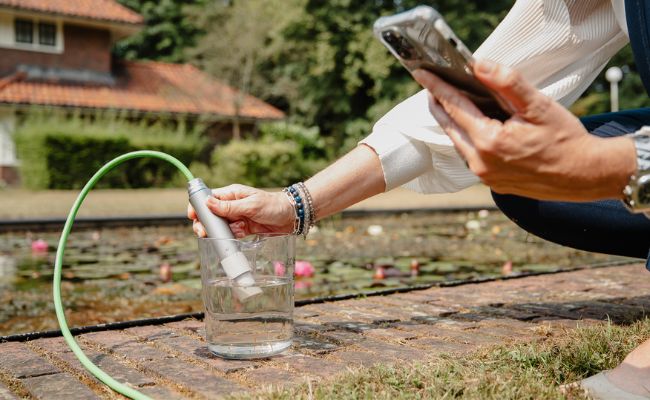Holland Sensor, based in the Netherlands, has developed a groundbreaking digital sensor capable of quickly and accurately measuring water quality in drinking water, wastewater, and surface water. The new sensor provides on-site results within minutes, enabling much faster detection of contamination by heavy metals such as lead, mercury, or arsenic. By eliminating the need to wait for laboratory results, this innovation allows for immediate action in cases of contamination, significantly improving response times and benefiting both water quality and public health.
Patented technology for on-site water monitoring
The Mizu Sensor, named after the Japanese word for water, is based on electrochemical technology and is protected by a European patent, with a global patent pending. The portable device is designed for ease of use, with the sensor no larger than a deodorant bottle and the electronics about the size of a lunchbox. Users are guided through the process using a mobile phone interface, and measurements can be completed with just a few simple steps. Results are instantly viewable on a smartphone, tablet, or laptop and can be stored directly in various databases.
Addressing a global challenge
Holland Sensor sees the Mizu Sensor meeting a significant global need for more practical and faster water monitoring solutions. Current methods for detecting heavy metals in water are often complex and time-consuming, but the Mizu Sensor offers a much quicker and more convenient alternative. With national and international regulations on water contamination, particularly for heavy metals, becoming more stringent, the Mizu Sensor is positioned as a forward-thinking solution. The sensor not only delivers faster results than laboratory tests but often matches or exceeds lab accuracy.
Future-proof technology
Holland Sensor plans to keep the Mizu Sensor up to date through continuous software updates, ensuring it can adapt to future requirements. In addition to heavy metals, the sensor will eventually be able to detect other harmful substances, such as PFAS. In the Netherlands, the Mizu Sensor is targeted at industrial water dischargers, water authorities, utility companies still using lead, water treatment facilities, and Rijkswaterstaat. Globally, the sensor could also serve industries like mining, which remains prevalent in regions such as the U.S. and South America.
Sustainable production and global expansion
Holland Sensor is in discussions with international partners and distributors to explore potential pilots and collaborations. In partnership with a Dutch manufacturer, the company is preparing to produce the Mizu Sensor in large quantities and ensure that it is recyclable. Production and delivery are expected to begin soon.
Source: Holland Sensor


